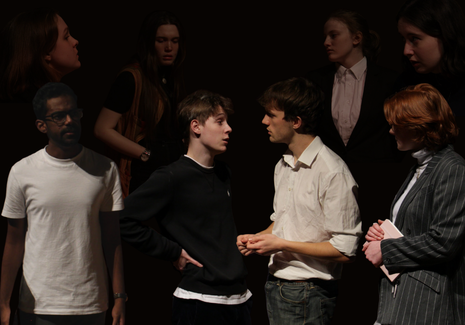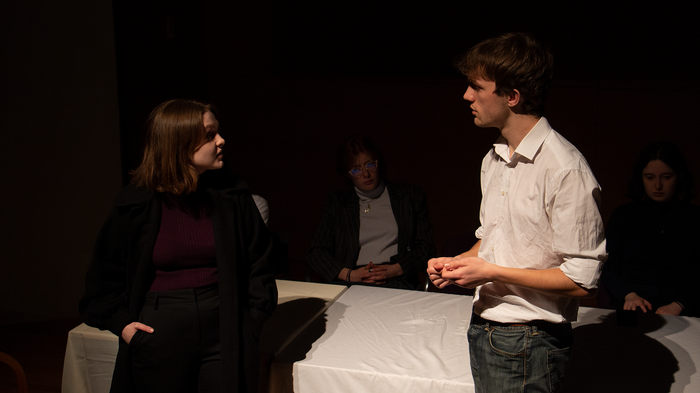‘A powerful caricature’: The Student Union Review
Brimming with wit, conniving characters and dirty, dirty politics

Content note: this contains mentions of suicide, domestic abuse, racism, anti-semitism, and transphobia
A truly toxic blend of moral righteousness and Machiavellianism, with twists and turns abound, form the basis of this thrilling political satire, written and directed by Jasper Cresdee-Hyde.
The sudden resignation of the Student Union President throws the remaining sabbatical officers into a rat race for the newly-empty throne, as a constitutional amendment passed just before the competition kicks off derails the Vice-President’s smooth transition to power.
Within the first minute of the play, we’re introduced to caricatures we know all too well: the charismatic and seemingly principled Harry (Theo Tompkins); the socially awkward socialist Ben (Haran Loganathan); the performatively woke Charlotte (Maia von Malaisé); the charming Winchester playboy, Felix (Sam Bedford); and the quiet and unassuming Alicia (Anna Freeman). Havoc unfolds as the characters ride through the political training ground in the prestigious setting of the University of Wessex, loosely modelled on our own Cambridge, where the student politicians of today are set to become the Westminster lackeys of tomorrow.
“Backstabbing, blackmail and malicious libel all grace the stage in equal measure”
Armando Iannucci’s The Thick of It meets the world of underhanded sabbatical officers, with equal amounts of caustic repartee and enough swearing to make dear Toope blush. The political concoction is no less lethal either, as the sabbs go to extreme lengths to pursue the presidency after Harry’s resignation: backstabbing, blackmail and malicious libel all grace the stage in equal measure, cutting somewhat close to home.
However, they aren’t the only powers at play on the Wessex political scene: there’s the tyrannical Vice-Chancellor, Anne McCulloch (Molly Elliott), who pulls the strings on her SU marionettes in an attempt to push through her ‘Legacy Project’. Meanwhile, Iona Rogan humorously plays Kate, the Editor-in-Chief of The Crack, the student newspaper of Wessex, controlling both the domain of public truth and her yes-men Mank (Jago Wainwright) and Alison (Niamh Howat).
Much to the detriment of all these characters, however, is the sudden emergence of WessFess: an anonymous messaging page that acts as the court of student opinion. Each of our characters face accusations of racism, transphobia and anti-semitism, which are utilised by rival candidates.
Throughout the play, we’re treated to endless witty exchanges between characters; a seamless transition between scenes: a feat achieved by Declan Boyd, Audrey Briggs, and Emily Naden; and Thomas Field’s Sherlockian score is undoubtedly worthy of praise. Magdalene’s Cripps Court Auditorium even became its own democratic assembly, with the audience made to play the role of the electorate, burdened with all the usual responsibilities of the voter: to be sycophantically hacked by candidates, granted the power to ask questions at hustings, and, of course, to cast their ballots.
“Offers some earnest reflections on both student and national politics”
The simplicity of the set gave the cast ample room to shine: Felix, described by Charlotte as ‘young, dumb and full of cum’, was brilliantly written and brilliantly acted; Bedford’s performance was unquestionably matched by von Malaisé’s Charlotte, who brought to life the sanctimonious, diversity-peddling ‘carbon-copy f**king peg-the-patriarchy Hillary Clinton c*nt’. Yelling profanities left, right and centre, the stamina of Loganathan’s vocal chords was commendable; meanwhile, Elliott’s portrayal of the Vice-Chancellor was chilling and powerful.
And although the play’s principal mode may be satire – the end of the play was far from parody. It is here that the play’s remaining mysteries are unravelled, and we finally see what lies beneath the exterior of our political performers. Without naming who, the true antagonist of the play will stop at nothing to achieve their goals – no matter the cost.
A chat with Jasper at the end revealed that no matter which candidate the audience chooses, in all of the four endings, the result is the same. Though reference to the Vice-Chancellor’s sinister ‘Legacy Project’ is a little unclear, the convergence of endings offers some earnest reflections on both student and national politics: the impossibility of change in the face of authority structures and bureaucracy, the futility of good intentions, and the illusion of meaningful political choice across a spectrum of political positions.
The audience are also left with some unanswered questions. Where do we place the blame – on the politician, or on the game? The despondent conclusion we can make from The Student Union is on the circular nature of corruption: that the people corrupt the institution and the institution corrupts the people (and answering which comes first is like asking whether the chicken came before the egg). Student politics is frequently referred to within the play as drinking from a ‘poisoned chalice’ – politics is a Faustian pact, and to play the game is to play a game of dirty hands.
Ultimately, the Student Union was a powerful caricature of student politics, brimming with wit, conniving characters and dirty, dirty politics.
 News / Judge Business School advisor resigns over Epstein and Andrew links18 February 2026
News / Judge Business School advisor resigns over Epstein and Andrew links18 February 2026 News / Gov grants £36m to Cambridge supercomputer17 February 2026
News / Gov grants £36m to Cambridge supercomputer17 February 2026 News / Hundreds of Cambridge academics demand vote on fate of vet course20 February 2026
News / Hundreds of Cambridge academics demand vote on fate of vet course20 February 2026 News / CUCA members attend Reform rally in London20 February 2026
News / CUCA members attend Reform rally in London20 February 2026 News / Union speakers condemn ‘hateful’ Katie Hopkins speech14 February 2026
News / Union speakers condemn ‘hateful’ Katie Hopkins speech14 February 2026











